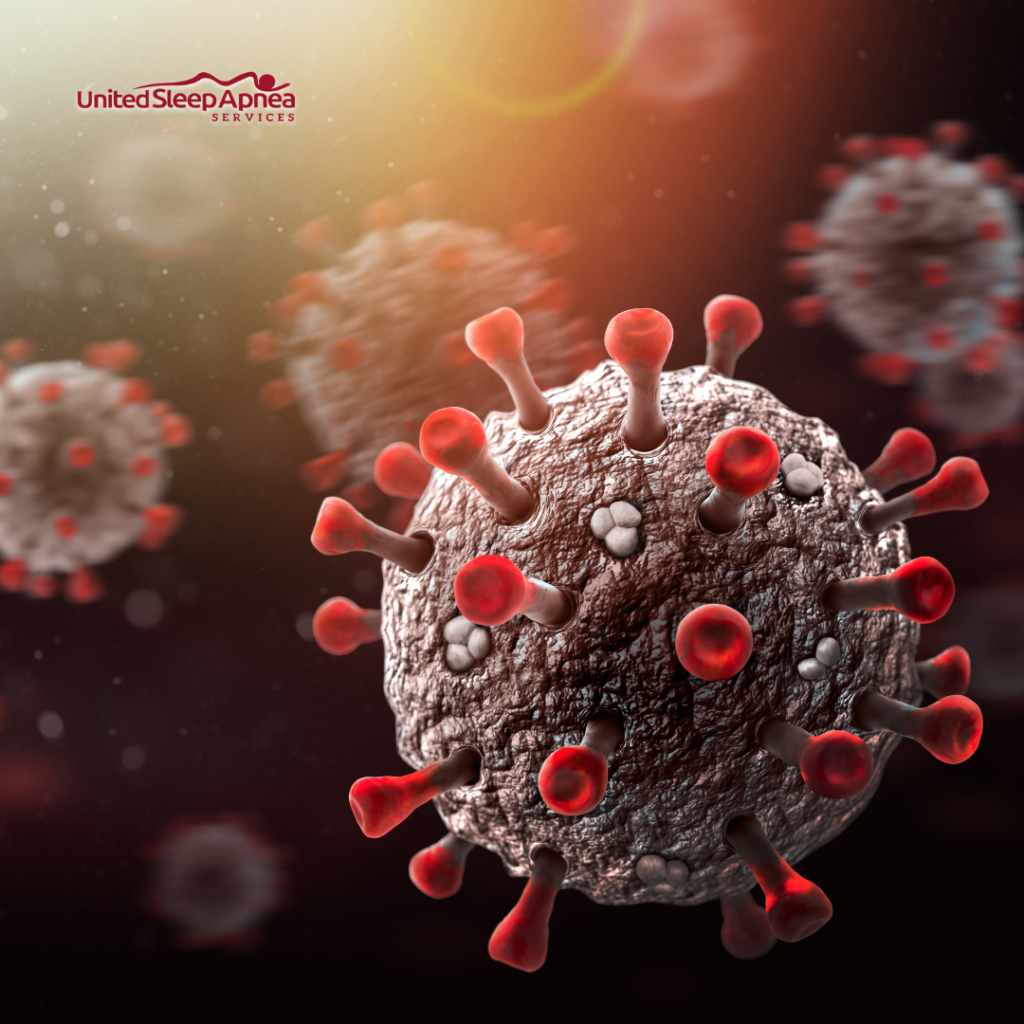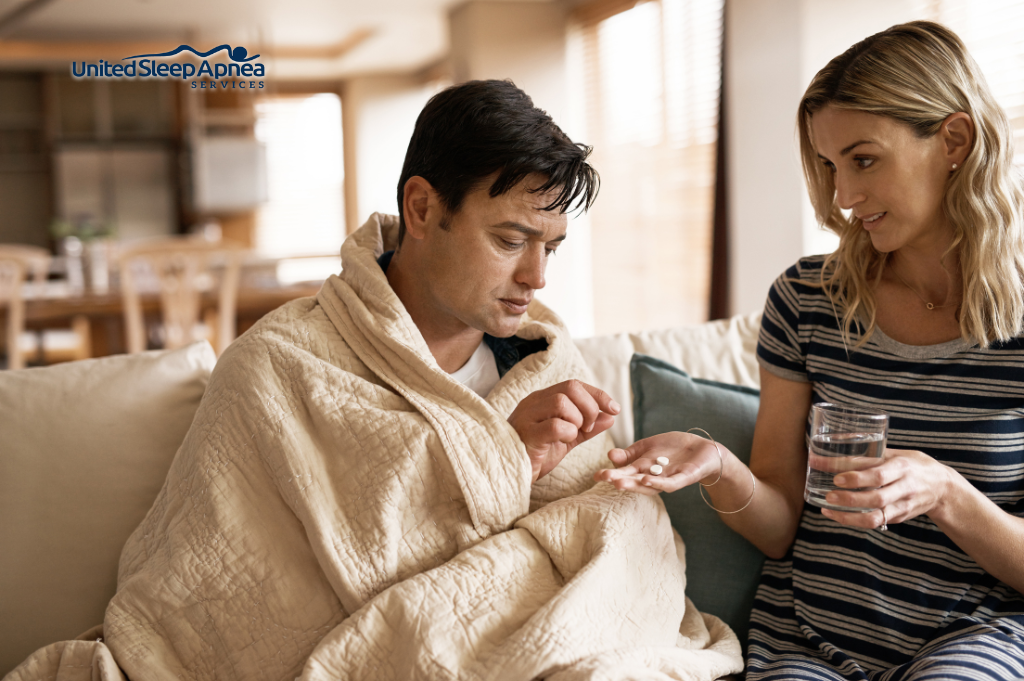Are you the one who catches a cold after a poor night’s sleep?
Do you feel low when you consistently lack sleep?
This is all because of the effect sleep deprivation has on your immune system’s function, metabolism, and regulation. This immunological function dysregulation decreases the body’s ability to react and respond to infections from bacteria and viruses.
According to the Centers for Disease Control (CDC), 50 – 70 million adults in the U.S. currently suffer from sleep disorders.
Also, researchers discovered that, in the 20th century, Americans slept about 1.5 – 2 hours less than usual. Another surprising finding states that nearly one-third of the working individuals in the U.S. sleep less than 6 hours a night.
In this article, let us dive deep into how and in what ways sleep deprivation or sleep loss affects the immune system.
Basics of the Human Immune System
The immune system is the human body’s defense system. The immune cells are present all over the body and perform their role as a defense mechanism against invading microbes or threats. These immune cells may be leukocytes or WBCs (white blood cells) based on their origin, structure, and functions.
The two primary immune systems include:
Natural system comprises granulocytes (neutrophils, eosinophils, basophils), blood monocytes, and natural killer cells (lymphocytes).
An adaptive system comprises B lymphocytes (B cells in Bone marrow), T lymphocytes (T cells in Thymus), B cell & T cell receptors (BCR/TCR).
The Defense Mechanism of the Immune System
A 2019 review article explicitly explains how the human immune system works when infectious microbes invade your body. In the case of failure of the first line of defense (by skin), the immune system gets activated. In the initial phase, the antigen-presenting cells (APCs) take up the antigen in the tissues and travel to secondary lymphoid organs. There, the antigen combines with MHC cells (Major Histocompatibility Complex). This stimulates the antigen-specific CD4 T-cells to convert into CD4 T-helper cells. These T-helper cells induce macrophages or B-cells to produce Immunoglobulin antibodies that attack the invading pathogens.
Depending on the type of pathogen, specific T/B cells, APCs, antigens, and antibodies come into play. After killing the pathogen, the activated B and T cells collapse. However, a few remain to act as memory cells that ensure a faster response the next time when the same pathogen tries invading the body.
Why are Viruses unique?
As living and non-living doppelgangers, viruses act as ideal parasites that depend on other cells (host cells) to survive and replicate. Outside the host cell, they are biologically inert and inactive. They attack other living organisms, including bacteria, plants, and animals. They are responsible for various infections, from causing deadly diseases (flu, Ebola, and Corona) to the common cold.
Generally, the stage wherein the viruses stay inactive inside the host cell is referred to as the lysogenic phase. On the contrary, the stage wherein the viruses remain active inside the host cell is referred to as the lytic phase.

What happens when a virus tries to enter a host cell?
When viruses encounter a host cell, they try to diffuse into the host cell’s plasma membrane or get digested by endosomes. If the host’s outer cell membranes prevent the fusion of the viral envelope with the host cell, the viral infection is prevented, thereby protecting the host cell and the body. If the cell membranes fail to avoid the fusion, viruses enter the host cell and kickstart the infection.
If the human immune system (leukocytes, APCs, T cells, B cells) fails to perform its function of attacking the invading viruses at the point of entry, the following biological processes occur:
When viruses enter host cells, they inject their DNA/RNA into the host cell and replicate their genetic material along with the host cell. This way, the viral particles rule the functions of the host cell and order to produce its viral protein in the place of the host cell’s usual protein production and replicates to produce new viral particles. Later, these viral particles kill the host cells and get ready to infect other body cells.
The British Society for Immunology explains the stages of viral replication: Attachment, Penetration, Uncoating, Replication, Assembly, and Virion release.
Association between Sleep and the Immune System
Researchers have studied the relationship between sleep and the immune system for years. Today, we have enough evidence that supports the fact that they are cross-related (bidirectional association). Immune system dysregulation alters sleep quality, and poor sleep affects the immune defense mechanism.
Research Studies on Sleep Deprivation and Immune Response
Numerous experimental studies have analyzed sleep deprivation’s effects on various immune parameters, like the count of leukocytes, leukocyte subsets, and cytokines (IFN, IL, and TNF). A few studies have also studied the serum’s concentration of antibodies and other complement factors.
A handful of studies have investigated the effects of REM (rapid eye movement) sleep deprivation on immune system parameters like CD4 cells, CD8 cells, and NK cells.

ARE YOU MISSING OUT ON THE MOST RESTORATIVE SLEEP OF YOUR LIFE?
Reduce your daytime fatigue with the latest diagnostic testing and physician services for improved health.
Our team of experts will listen to your concerns, guide you through the process, and answer all your questions.
Experimental Studies on Mice
A group of researchers conducted a study to analyze the extent of the intervention of sleep deprivation on the immunity of mice to the influenza virus. The study compared two sets of mice with and without immunization. The results showed that sleep-deprived mice exhibited a poor immune response despite vaccination, proving that sleep plays a significant role in optimizing the immune response against invading viruses.
Another comparative study published in the Journal of Sleep discovered that short-term sleep deprivation had minimal effects on mucosal and humoral immunity in adult mice.
Experimental Studies on Humans
A 2015 study published in the Journal of Immunology Research examined how sleep deprivation affects the immune response against bacteria, viruses, and other pathogens. Until today, this research served as striking evidence that lack of sleep leads to decreased immune response and an increased risk of infections.
Another research published (2017) in the Journal of Sleep investigated 11 pairs of identical twins to understand the effect of chronic sleep deprivation on the immune response. Indeed, this research is the first study eventuated under real-life conditions (natural environment) rather than a sleep laboratory condition. The study inferred that the subjects with reduced sleep duration had a depressed immune and inflammatory response than the twin sibling.
Effects of Sleep on the Host Defense Mechanism: A Physiological Review
A 2019 review published in the Journal of Physiological Reviews presented a series of insightful research findings that have happened so far concerning the effects of sleep on host defense mechanisms. Highlights of the study include:
Effect of Sleep on Immune Parameters

Leukocyte and Leukocyte-Subset Cells:
Generally, leukocyte cells migrate between tissues and organs via the bloodstream and lymphatic system. Experimental studies investigated the effects of various sleep patterns, viz. reduced sleep and total sleep deprivation, and manipulated sleep restriction against the circulating leukocyte counts in humans. A few other studies found that lack of sleep led to a reduction in neutrophil counts. Additionally, another study discovered that reduced sleep paves the way to a total decrease in the circulating monocyte, lymphocyte, and lymphocyte-subset (CD4, CD8, Nk cells, and B cells) counts.
Cytokine and Cytokine Receptors:
Research found that sleep has a differential influence on the cytokines based on different factors, notably the method of assessing the cytokines and the time of assessment. Hence, owing to these experimental variations, the findings also vary. However, the significant result states that sleep loss for more than a night causes an unwanted increase in the circulating IL-6 cytokines. A study showed that there were nil changes in their counts upon sleep deprivation for other cytokines, viz., the TNF receptor. In contrast, further research showed an increase in the TNF receptor count after continued sleep deprivation for up to four consecutive nights. Yet another study exhibited an unexpected rise in the circulating IL-1 levels in individuals who had sleep deprivation for a single night. In other cytokines, viz., the IL-12 count increased to nocturnal sleep loss in a human study.
The Activity of Immune Cells:
A few studies investigated the effect of sleep loss on parameters like natural killer cell activity and multiplication. A human study investigated sleep deprivation, showing a natural killer cell activity reduction. A set of other research studies identified that prolonged sleep deprivation causes an adaptive process. In this case, over time, normalization occurs instead of further reduction.
Antibodies and Other Complementary Factors (C3 and C5):
A research study found that one night of complete sleep loss in humans caused an unwanted steady increase in the immunoglobulin antibodies, including IgG, IgM, and IgA. Supporting this research, another human-based study revealed that 1-2 days of sleep deprivation increased the circulating IgA levels. The circulating levels of complementary factors, namely C3 and C5, that support the immune functions increased after acute sleep deprivation. Another one-night sleep study found an increase in the cell adhesion molecules, namely, E-selectin and ICAM-1, upon one nocturnal sleep loss.
The Effect of Sleep on Immunological Memory
Sleep plays a vital role in immunological memory as it interferes with the migration of lymphocytes from one tissue to another. A lot of investigations have been done to study the effect of sleep on the consolidation phase of immunological memory. However, experts suggest that further in-depth studies must be done to comprehend the impact of sleep on the recall phase of the immunological memory.
Sleep deprivation also affected the immunological memory’s phagocytosis and the APC cells’ ability to take up antigen.

ARE YOU OR YOUR LOVED ONES AFFECTED BY SLEEP APNEA?
Our process is designed using a patient-centered, holistic curative model that focuses on lowering costs while improving outcomes.
We serve veterans, minorities, families, and those who can’t get tests done at other facilities
Insomnia and Immune response
Difficulty falling asleep, frequently disrupted sleep, early wake-ups, and daytime sleepiness characterize insomnia. A particular human study found a reduction in the circulating levels of lymphocyte cells, including CD4, CD8, and T cells, among chronic primary insomniacs compared to healthy sleepers.
Many research studies have concluded that reduced sleep or chronic sleep deprivation leads to various health concerns (metabolic dysregulation, cardiovascular diseases, obesity, cancer, and neural disorders). These consequences result from a poor or inflamed immune system due to poor sleep or total sleep loss.
Sleep Apnea and Immune Response
Through various research studies, scientists found that OSA (Obstructive Sleep Apnea, a breathing-based sleep disorder) dramatically influences antigen-specific immune responses. A study also discovered that sleep apnea patients showed low-intensity inflammatory reactions. Experts have started diagnosing sleep apnea cases via a weakened immune system and response.
Conclusion
Substantially, many research studies prove that sleep deprivation influences the innate and adaptive immune response and increases the chances of immune dysregulation. When sleep deprivation continues and is left untreated in individuals, immune dysregulation leads to lower inflammatory responses by the immune cells. This, in turn, weakens your body’s whole network of the immune system, furthering the risk of infections and the onset of serious illnesses/diseases.
So, get restful sleep, reduce the risk of infection, and protect your immune system to fight future outbreaks.


